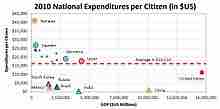In economics and political science, fiscal policy is the use of government budget or revenue collection (taxation) and expenditure (spending) to influence economic. The two main instruments of fiscal policy are government taxation and expenditure. Changes in the level and composition of taxation and government spending can impact the following variables in the economy: (1) aggregate demand and the level of economic activity; (2) the pattern of resource allocation; and (3) the distribution of income.
The three main stances of fiscal policy are:
- Neutral fiscal policy, usually undertaken when an economy is in equilibrium. Government spending is fully funded by tax revenue and overall the budget outcome has a neutral effect on the level of economic activity.
- Expansionary fiscal policy, which involves government spending exceeding tax revenue, and is usually undertaken during recessions.
- Contractionary fiscal policy, which occurs when government spending is lower than tax revenue, and is usually undertaken to pay down government debt .
These definitions can be misleading however. Even with no changes in spending or tax laws at all, cyclic fluctuations of the economy cause cyclic fluctuations of tax revenues and of some types of government spending, which alters the deficit situation; these are not considered to be policy changes. Therefore, for purposes of the above definitions, "government spending" and "tax revenue" are normally replaced by "cyclically adjusted government spending" and "cyclically adjusted tax revenue". Thus, for example, a government budget that is balanced over the course of the business cycle is considered to represent a neutral fiscal policy stance.
Methods of Funding
Governments spend money on a wide variety of things, from the military and police to services like education and healthcare, as well as transfer payments such as welfare benefits. This expenditure can be funded in a number of different ways:
- Taxation
- Seigniorage, the benefit from printing money
- Borrowing money from the population or from abroad
- Consumption of fiscal reservesSale of fixed assets (e.g., land)
- Borrowing: A fiscal deficit is often funded by issuing bonds, like treasury bills or consols and gilt-edged securities. These pay interest, either for a fixed period or indefinitely. If the interest and capital requirements are too large, a nation may default on its debts, usually to foreign creditors. Public debt or borrowing : it refers to the government borrowing from the public.
- Consuming prior surpluses: A fiscal surplus is often saved for future use, and may be invested in either local currency or any financial instrument that may be traded later once resources are needed; additional debt is not needed. For this to happen, the marginal propensity to save needs to be strictly positive.

Fiscal Policy
Comparison of National Spending Per Citizen for the 20 Largest Economies is an example of various fiscal policies.